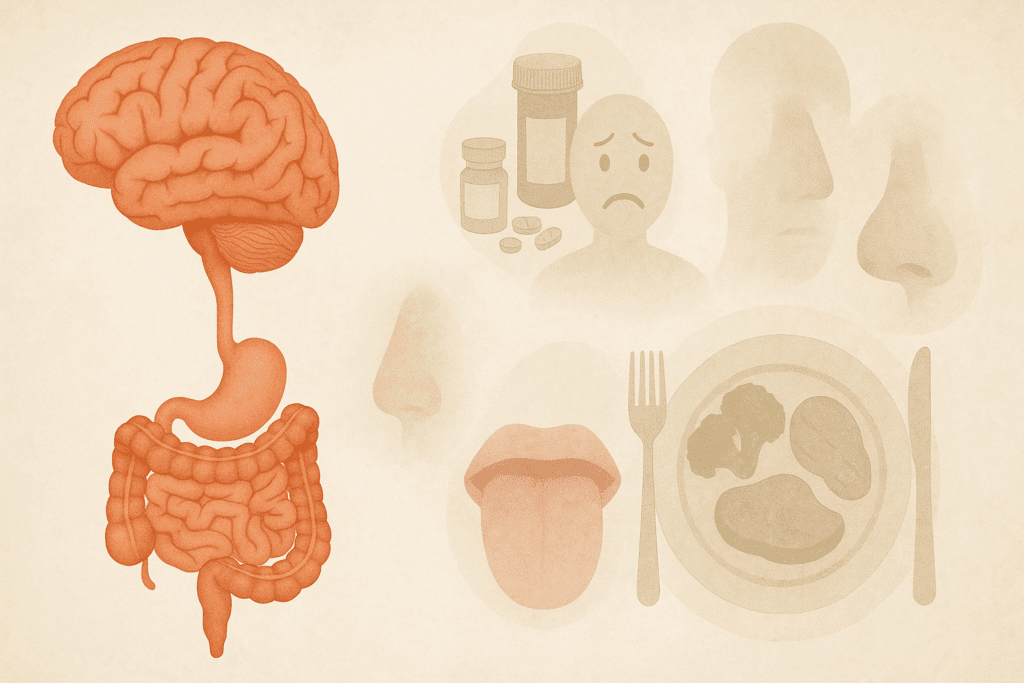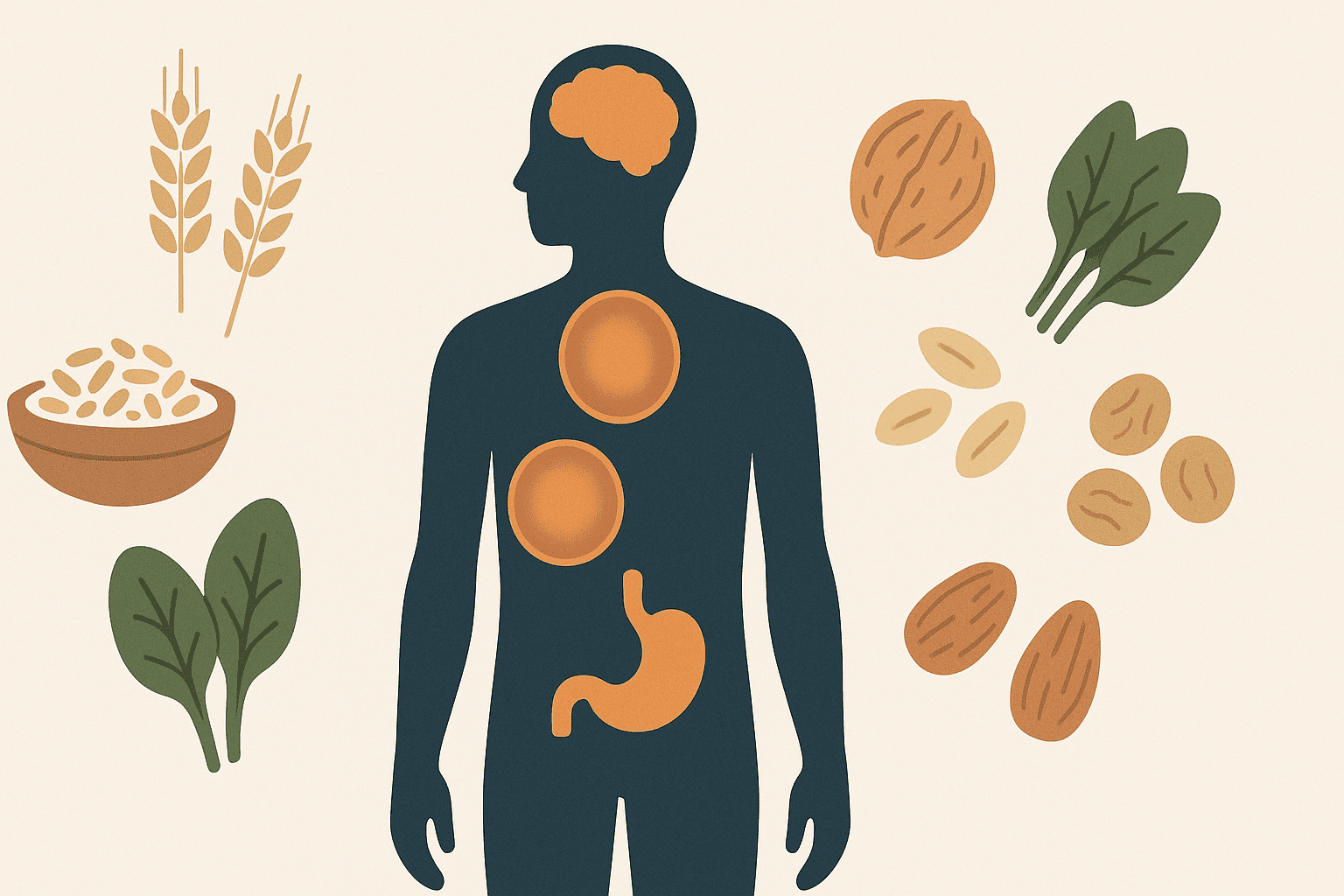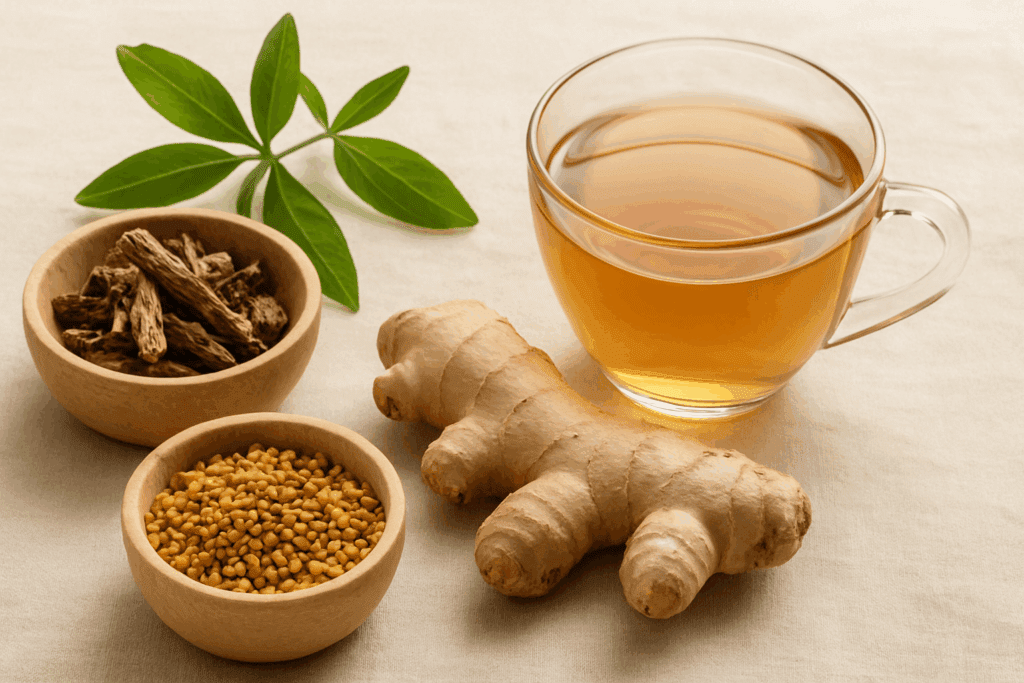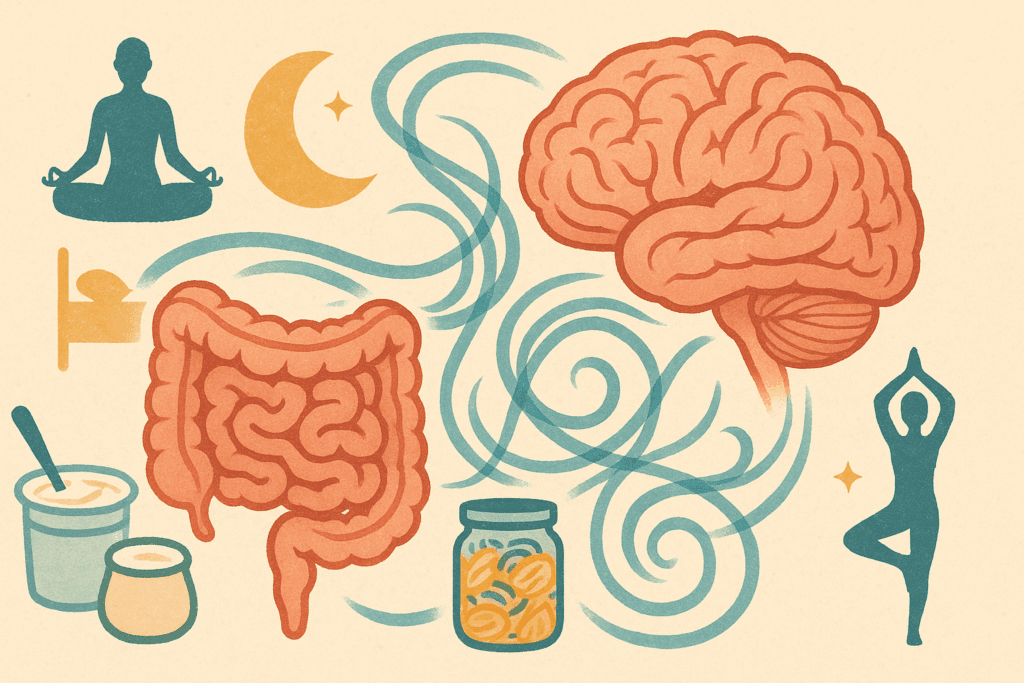The human appetite, that instinctive drive to eat and nourish our bodies, is a dynamic function influenced by numerous factors, both physiological and psychological. While most discussions in modern health circles focus on how to suppress or control appetite, there exists a significant population seeking the opposite—people who want to know how to gain appetite fast. For individuals recovering from illness, managing chronic stress, or coping with age-related changes, the loss of hunger can lead to serious nutritional deficiencies, weakened immunity, and poor quality of life. This article explores how to gain appetite naturally, weaving together evidence-based methods and real-world insights while also reviewing over-the-counter appetite stimulant options that may offer support when needed.
You may also like: How to Stop Emotional Eating and Regain Control: Mindful Nutrition Strategies That Support a Healthier Lifestyle

Understanding the Underlying Causes of Low Appetite
Before diving into strategies for how to get hunger back, it’s essential to understand why appetite declines in the first place. Appetite is regulated through a complex interplay between hormones, neurotransmitters, and brain centers, particularly the hypothalamus. Conditions such as depression, anxiety, chronic fatigue, and gastrointestinal disorders can disrupt these systems. Additionally, medications—especially antibiotics, chemotherapy agents, and opioid-based painkillers—are well-known to suppress appetite as a side effect. In aging adults, reduced sensory input (like diminished taste or smell) can dull the desire to eat. Understanding these underlying causes allows for more targeted and effective solutions.
It’s also critical to distinguish between temporary appetite loss, such as during a brief illness, and chronic issues that persist for weeks or months. The latter may require a deeper medical evaluation. However, in many non-critical cases, dietary and lifestyle interventions, combined with expert-guided supplementation, can be highly effective in helping individuals increase appetite without resorting to prescription medications.

The Role of Nutritional Deficiency in Reduced Appetite
Often overlooked, nutrient deficiencies—particularly in B vitamins, zinc, and magnesium—can impair hunger signals. For example, vitamin B1 (thiamine) plays a vital role in appetite regulation and energy metabolism. Without it, individuals may experience both a reduced appetite and fatigue. Similarly, zinc is essential for maintaining taste and smell acuity. When these senses are dulled, food becomes less appealing, which directly impacts desire to eat.
Addressing nutritional imbalances can be a foundational step in learning how to make yourself eat more. Rather than simply focusing on calorie-dense foods, it may be more productive to assess micronutrient status through a blood panel, especially if appetite loss has been prolonged. Correcting deficiencies not only restores appetite but can also improve energy levels, mood, and digestion—all of which work synergistically to support better eating habits.
How to Gain Appetite Naturally Through Lifestyle and Behavioral Strategies
The body thrives on rhythm. Establishing a consistent eating routine, even when hunger is absent, can gradually retrain the brain’s hunger-regulating centers. Setting mealtimes and sticking to them—even if starting with small portions—can be remarkably effective over time. Creating a pleasant mealtime environment, with reduced distractions and calming sensory stimuli, helps shift eating into a positive, mindful experience rather than a task or chore.
Another effective method for how to gain appetite fast is to engage in moderate physical activity. Even a 20-minute walk can stimulate the release of endorphins and increase metabolic activity, both of which may enhance hunger. Exercise also supports mental health, which is particularly important if emotional factors such as anxiety or depression are involved. As appetite improves, it’s crucial to listen to internal cues, gradually increasing portion sizes and food variety in response to growing hunger.
Incorporating favorite or comforting foods—especially those rich in healthy fats and proteins—can help reawaken the pleasure of eating. Foods such as avocado, full-fat yogurt, nuts, and nut butters provide calorie density without requiring large portions. For individuals wondering how to make themselves eat more, the focus should be on quality, satisfaction, and consistency rather than sheer volume.

Herbal and Natural Supplements That May Increase Appetite
Nature offers a variety of herbal remedies known to support digestion and stimulate hunger. One such option is gentian root, a bitter herb traditionally used in European medicine to promote gastric secretions. Bitters work by stimulating receptors in the tongue that signal the stomach to prepare for food, effectively increasing appetite. Another well-researched option is fenugreek, which has demonstrated appetite-enhancing properties in some clinical settings, possibly due to its effects on insulin sensitivity and digestion.
Ginger is another multipurpose botanical that not only aids digestion but also enhances gastric motility, making food more appealing and reducing bloating. For individuals looking for a gentle and non-prescription appetite stimulant, these herbal remedies may offer a useful entry point. However, they should be selected with care and ideally discussed with a qualified healthcare provider to ensure safety and proper dosage.
Incorporating herbal supplements requires a nuanced understanding of the individual’s overall health status. While these substances are natural, they are not free from potential interactions with medications or contraindications. Therefore, anyone considering herbal options to increase appetite should approach them with the same level of discernment as they would with pharmaceutical drugs.

Over-the-Counter Appetite Enhancers and OTC Medication Options
For those who struggle with persistent appetite loss, there are several over-the-counter appetite enhancers available in pharmacies and health stores. These products are marketed under various labels, often containing vitamins, minerals, herbal extracts, and amino acids believed to support hunger. One common ingredient in such formulations is cyproheptadine, an antihistamine with known appetite-stimulating side effects. While not available in every country without a prescription, some OTC appetite stimulant drugs may include similar compounds.
Another widely available category includes appetite stimulant OTC supplements designed for weight gain or post-illness recovery. These often include a mix of B-complex vitamins, lysine, and sometimes zinc or magnesium. Although not as potent as prescription medications, these non-prescription appetite stimulants may offer noticeable improvements when used consistently and paired with other lifestyle strategies.
It’s important to recognize that not all over-the-counter appetite stimulant products are created equal. Reading labels, understanding ingredient functions, and checking for third-party testing or GMP (Good Manufacturing Practices) certification can help consumers choose higher-quality supplements. Consulting with a dietitian or integrative health practitioner can also provide tailored recommendations that align with individual health needs.

The Psychological Component: Reframing Mindset Around Eating
Appetite is not purely a physiological process. Emotional and psychological states can heavily influence hunger and eating behavior. In some cases, individuals may find themselves saying, “I know I need to eat, but I just don’t feel like it.” This disconnect often reflects deeper emotional or cognitive blocks. Addressing these through cognitive-behavioral therapy (CBT), mindfulness-based eating approaches, or even simple journaling can help individuals uncover and overcome subconscious barriers to food intake.
Building a more positive association with food can also contribute to how to gain appetite naturally. For some, this might involve cooking with loved ones, exploring new cuisines, or engaging the senses with colorful, aromatic meals. For others, structured meal planning can reduce the mental burden of food choices, allowing appetite to return without added stress. The act of preparing and enjoying food, rather than simply consuming it, becomes a therapeutic ritual that fosters both physical nourishment and emotional satisfaction.
Sleep, Stress, and the Gut-Brain Connection
Sleep and stress are two often underestimated influences on appetite regulation. Poor sleep disrupts the balance of ghrelin and leptin—two hormones intricately linked to hunger and satiety. Chronic stress, on the other hand, can suppress appetite through elevated cortisol levels or, in some individuals, lead to erratic eating patterns. Cultivating good sleep hygiene and stress-reduction practices—such as yoga, meditation, or breathing exercises—can indirectly yet powerfully support efforts to increase appetite.
Emerging research on the gut-brain axis also highlights the role of microbiome health in appetite signaling. Dysbiosis, or an imbalance of gut bacteria, can lead to digestive discomfort and reduced hunger. Incorporating probiotics through fermented foods like kefir, sauerkraut, and yogurt, or supplementing with clinically validated probiotic strains, may restore gut balance and enhance hunger cues. When exploring how to gain appetite fast, the importance of gut health should not be underestimated.
Creating a Personalized Plan: Small Changes, Big Impact
The journey toward regaining appetite is rarely linear, and success often lies in the details. Rather than relying on a single solution, a personalized plan that combines multiple strategies tends to yield better results. For instance, someone recovering from surgery may benefit from a blend of over-the-counter appetite stimulant supplements, nutrient-dense smoothies, and a gentle exercise regimen. Another individual experiencing emotional burnout might focus more on sleep, mood support, and comfort meals that evoke positive memories.
Experimenting with meal timing, food temperature, texture, and even presentation can influence desire to eat. Warm, aromatic dishes are often more appealing than cold, bland ones. Smooth, creamy textures may be easier to consume than rough or dry foods, especially for individuals dealing with mouth or throat sensitivity. Small plates with artfully arranged portions can also help reduce the feeling of being overwhelmed by food.
Tracking progress—whether through journaling, photo logs, or nutrition apps—can provide motivation and insight into which methods are most effective. Over time, even modest improvements in appetite can lead to significant gains in energy, immunity, and overall wellness.

When to Consider Professional Help
While many cases of low appetite can be managed through self-care and nutritional strategies, there are times when professional guidance becomes necessary. If appetite loss persists for more than two weeks without clear improvement, or if it’s accompanied by significant weight loss, fatigue, or gastrointestinal symptoms, seeking medical attention is critical. Registered dietitians, integrative physicians, and mental health professionals can work collaboratively to identify and treat root causes.
In certain situations, prescription medications may be necessary. These could include drugs like megestrol acetate, mirtazapine, or dronabinol, which are typically reserved for more severe cases of appetite suppression. However, these medications carry their own risks and side effects, underscoring the importance of exhausting safer, natural approaches first.
Navigating the wide landscape of appetite support requires both self-awareness and professional insight. A balanced approach that honors both the science and the art of nourishing the body offers the most sustainable path forward.
Frequently Asked Questions (FAQ): How to Gain Appetite Fast and Naturally
1. Can adjusting my circadian rhythm help increase appetite? Yes, aligning your circadian rhythm can have a significant impact on appetite regulation. The body’s internal clock governs not just sleep-wake cycles, but also hunger cues. Individuals with irregular schedules, such as night-shift workers or frequent travelers, often report diminished appetite due to disrupted meal timing. To support how to gain appetite fast, prioritize consistent sleep and mealtimes, ideally synced with daylight hours. Morning exposure to natural sunlight and maintaining a regular bedtime may improve hunger regulation by balancing hormones like ghrelin and cortisol.
2. What role do emotions play in suppressing or enhancing appetite? Emotional states like grief, anxiety, and chronic stress can significantly influence hunger. For many, emotional distress leads to a disinterest in food, making it harder to increase appetite without addressing mental health. Others may swing to emotional eating, which carries its own challenges. Understanding your emotional triggers is key to learning how to gain appetite in a sustainable way. Working with a therapist or practicing emotional regulation techniques such as journaling or art therapy may indirectly help restore appetite by stabilizing mood and mental clarity.
3. Are certain scents or flavors more effective at stimulating hunger? Yes, aromatic and flavorful foods can act as sensory stimulants, triggering digestive enzymes and salivary responses that make eating more appealing. Spices like cinnamon, cumin, and turmeric, or warming herbs like rosemary and basil, can naturally enhance meals and help increase appetite. Citrus aromas and vanilla are also known to elicit mild hunger responses in some individuals. If you’re wondering how to get hunger back without medication, experimenting with olfactory stimulation during meal prep may offer an underrated yet effective approach.
4. How does hydration impact appetite, and can drinking more help me eat more? Hydration plays a subtle but important role in regulating hunger signals. Dehydration can often mask itself as reduced appetite or general fatigue. Drinking water 30 minutes before meals can help prepare the digestive system and even boost feelings of hunger. However, drinking too much water during meals might create early satiety, especially for those trying to make themselves eat more. Striking a balance between staying hydrated and not overfilling your stomach is key to promoting natural hunger.
5. What social strategies can help me learn how to make myself eat more? Eating with others can serve as both motivation and distraction, especially when appetite is low. Engaging in communal meals or attending food-based gatherings creates positive associations with eating and can help normalize mealtime behavior. Conversation and connection often act as subtle cues to eat more, making it easier to consume calories without focusing on the act of eating itself. If you’re working on how to gain appetite fast, try scheduling lunches with coworkers or cooking shared meals with family. Over time, these habits may reignite your appetite naturally.
6. Are there long-term risks to using over the counter appetite stimulant options? While many over-the-counter appetite enhancers are marketed as safe and natural, they aren’t entirely without risk. Using an over the counter appetite stimulant or relying on over counter appetite stimulant drugs for extended periods may lead to dependency, tolerance, or nutrient imbalances if not monitored. Some appetite stimulant OTC formulations may contain synthetic ingredients or undisclosed herbs that interact with medications or underlying health conditions. To ensure safety, it’s best to use any non prescription appetite stimulant under the supervision of a healthcare provider and to reevaluate its need regularly.
7. Can gut microbiome health affect how to gain appetite fast? Absolutely. The health of your gut microbiome directly influences digestion, nutrient absorption, and even hormone production involved in hunger signaling. A disrupted gut flora, often caused by antibiotics, poor diet, or chronic stress, can blunt hunger cues and impair digestion. Introducing prebiotic and probiotic foods, such as kimchi, kefir, and garlic, can help rebalance gut bacteria. If you’re seeking how to get hunger back through holistic means, focusing on gut health is a foundational step that should not be overlooked.
8. How do age-related changes influence appetite and which strategies work best for older adults? As we age, several factors such as slower metabolism, reduced taste sensitivity, and changes in digestive function can lead to a natural decline in appetite. For older adults, this can result in unintended weight loss and malnutrition. In such cases, a gentle approach that includes smaller, more frequent meals with appealing textures and flavors is often more successful than large meals. Including an appetite medication or appetite stimulant OTC may also be considered, especially if natural strategies fall short. However, it’s vital that any medicine for appetite be age-appropriate and used under medical supervision.
9. Are there food textures or temperatures that can help stimulate appetite? Yes, sensory factors like texture and temperature play a significant role in how appealing food feels, especially for individuals recovering from illness or those with sensory sensitivity. Warm, creamy soups or chilled, refreshing smoothies might be more tolerable than dry or highly fibrous meals. Adjusting food texture can be especially helpful for those asking how to make myself eat more without overwhelming the digestive system. Finding the right combination often requires trial and error, but experimenting with softness, warmth, and moisture levels can lead to better meal acceptance and increased appetite.
10. What are the latest innovations in appetite support that go beyond traditional approaches? Emerging technologies and research are offering new hope for individuals struggling to increase appetite. Digital therapeutics, including appetite-tracking apps that use behavioral data to offer real-time prompts, are being explored as tools to support meal timing and consistency. Some companies are developing wearable devices that monitor physiological hunger cues, providing biofeedback to improve self-awareness. Additionally, research into targeted peptide therapies and gut-brain signaling enhancers is paving the way for more personalized appetite medication in the future. While these aren’t yet mainstream, they represent promising frontiers for anyone looking for more advanced solutions beyond traditional over the counter appetite enhancers or over counter appetite stimulant drugs.
Conclusion: Gaining Appetite Naturally Requires a Thoughtful, Multidimensional Approach
Learning how to gain appetite fast is not just about eating more—it’s about restoring the body’s natural signals for nourishment, pleasure, and vitality. Whether appetite loss stems from a temporary illness, emotional stress, or chronic health issues, there are practical and effective strategies available to help reclaim the desire to eat. From understanding the biological roots of hunger to exploring appetite stimulant OTC options, individuals can find relief through a variety of natural and medically sound methods.
Key practices like maintaining a regular eating schedule, incorporating nutrient-dense foods, supporting mental health, and considering over-the-counter appetite enhancers can work synergistically to increase appetite over time. For those wondering how to get hunger back or how to make themselves eat more, the solution often lies in small, consistent changes that honor both the body’s needs and the individual’s unique lifestyle.
Ultimately, the most successful strategies are those rooted in trust—trust in your body’s ability to heal, trust in expert-backed advice, and trust in the process of gradual, sustainable improvement. With careful attention, patience, and the right support, it is entirely possible to restore a healthy appetite and reignite a joyful relationship with food.
Was this article helpful? Don’t let it stop with you. Share it right now with someone who needs to see it—whether it’s a friend, a colleague, or your whole network. And if staying ahead on this topic matters to you, subscribe to this publication for the most up-to-date information. You’ll get the latest insights delivered straight to you—no searching, no missing out.
Further Reading:
13 Ways to Increase Your Appetite
Supplements, Medications, and Lifestyle Changes to Help Stimulate Appetite

